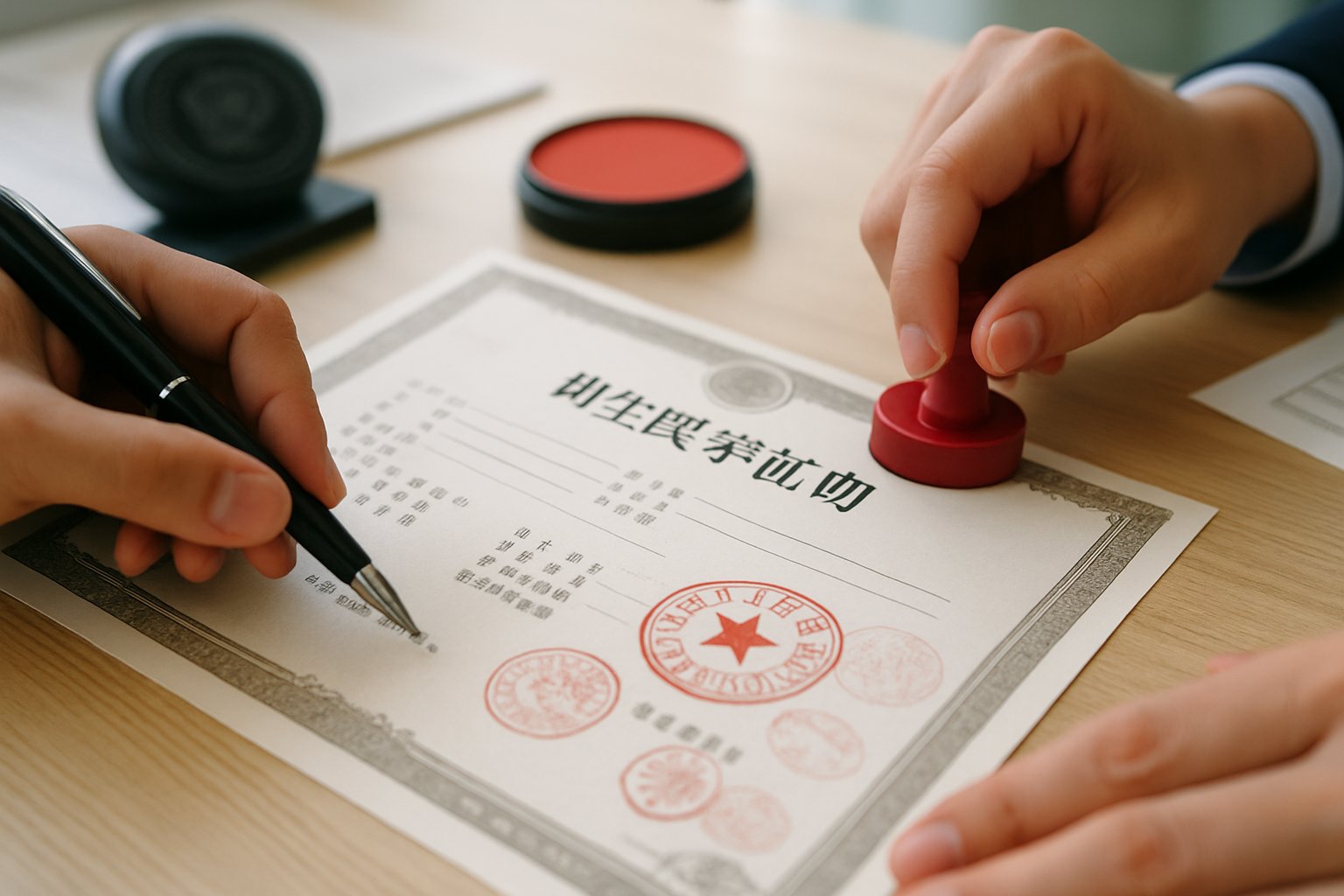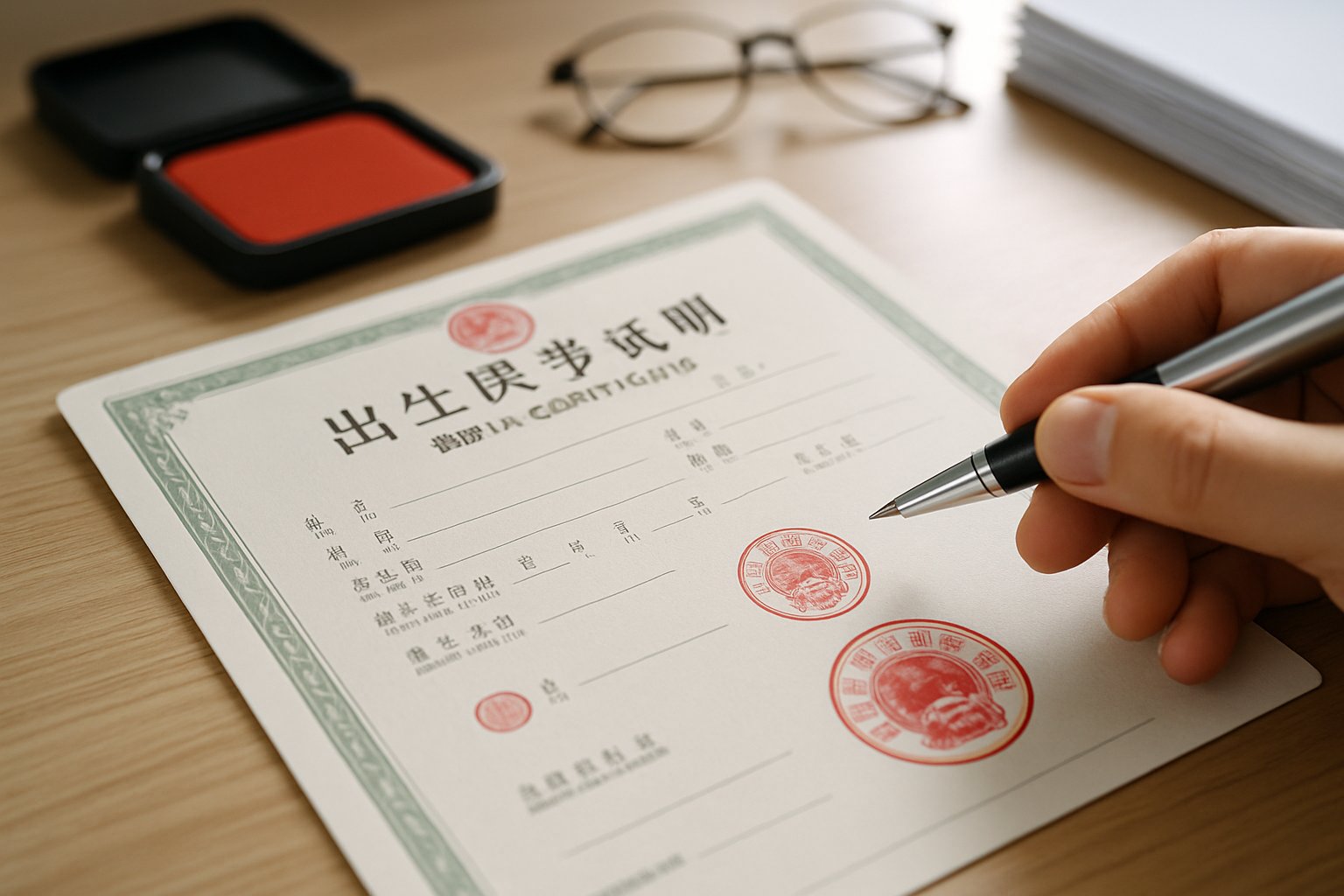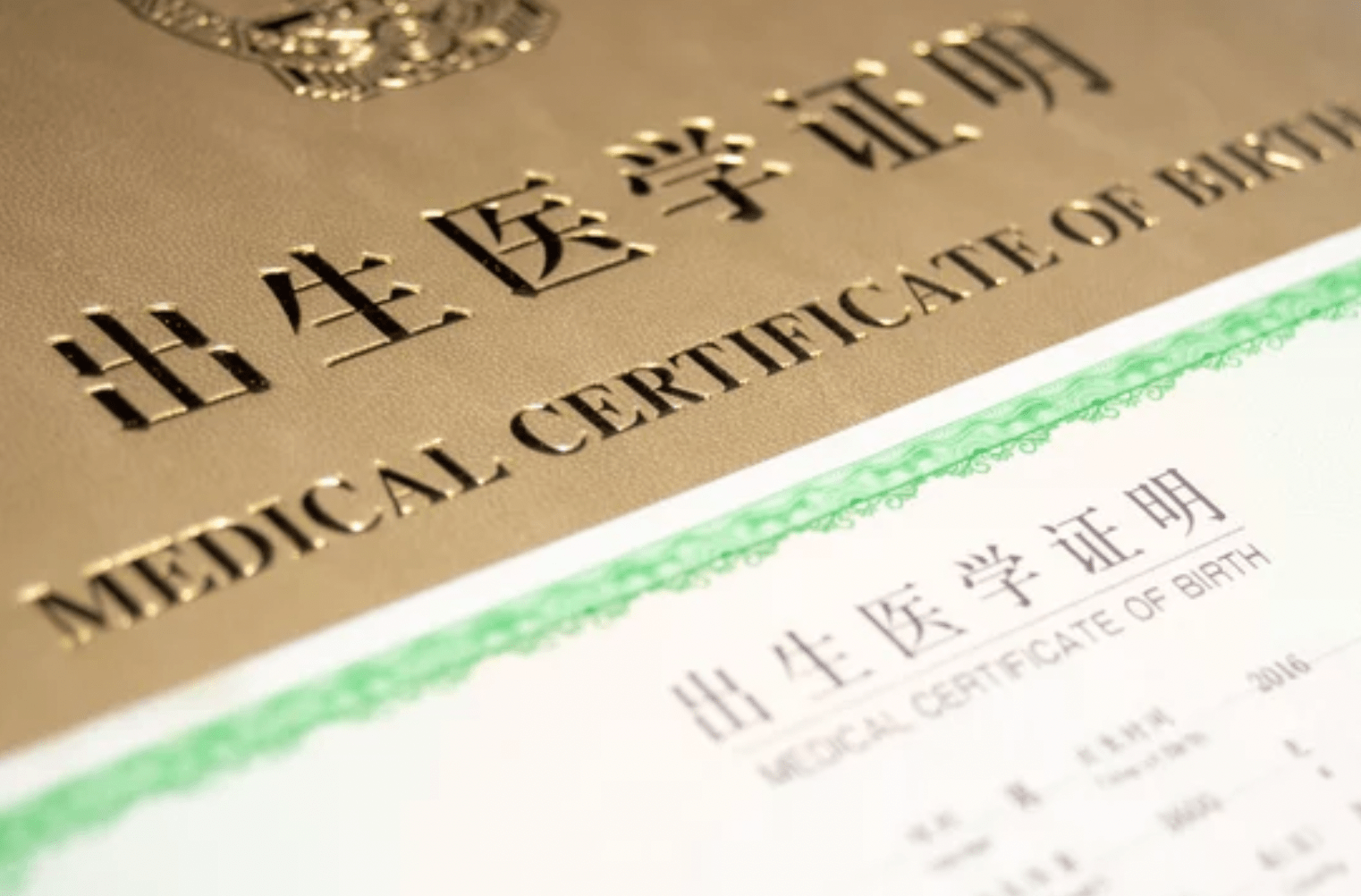A Chinese birth certificate proves your birth, citizenship, and where you live. You’ll need it for things like school, getting a passport, or immigration. There are two main types: one from the Public Health Department and another notarized version from the Local Notarial Office.
If you were born in China or have to prove your birth there, you should know how to get or use a Chinese birth certificate. The process sometimes includes notarization and even an apostille if you need to use it outside China.
Your birthplace—urban or rural—can change how the certificate is issued and which benefits you might get. The requirements and differences between the medical and notarial birth certificates can trip people up, so it’s worth understanding them.
To use it abroad, it must be notarized, translated into English, and legalized (apostille or consular). Missing proof? You may use hukou, affidavits, or police records instead . Want to know exactly how? Read on!
Chinese Birth Certificate Essentials
So, what’s a Chinese birth certificate, and who actually needs one? It records your birth details and proves your citizenship in China.
Whether you’re a citizen, expat, or adoptee, you’ll need to know what’s required to get or validate this official record.
What Is It And Why You Need One
This official document lists your name, birth date, birthplace, parents’ names, and registration number. Hospitals usually issue it right after you’re born.
You’ll need it for ID checks, school, immigration, and legal stuff. Without it, claiming citizenship or getting public services can become a headache.
The certificate also shows if you’re from an urban or rural area, which can affect your rights and benefits.
Who Must Get One—Kids, Expats, Adoptees
Every child born in China needs a birth certificate, whether born before or after 1996. This links your birth to the hukou, China’s household registration system.
Expats with kids born in China often have to get a birth certificate for immigration or school. Adoptees from China must get one to legalize their identity in their new country.
If you’re planning to use your Chinese birth certificate abroad, you’ll probably have to notarize it—and sometimes get an apostille, depending on where you’re going.
Make sure your website is legit too. Read ICP License: What It Is And How To Get One.
Types & Issuing Steps
There are two main types of Chinese birth certificates. Which one you get depends on when you were born and how your birth was registered.
Each type has its own paperwork and legal steps. Knowing the difference helps you get the right certificate for your situation.
Post‑1996 Medical Certificate + Notarization
If you were born after 1996, the hospital gives you a medical certificate when you’re born. This is your first proof of birth and citizenship.
It includes your name, birth date, and birthplace. To use this certificate abroad or for legal stuff, you’ll often need to get it notarized at a Local Notarial Office, which checks that it’s real.
If you want to use it in another country, you’ll need an apostille or consular legalization. These extra steps let foreign agencies accept your certificate.
Pre‑1996 Birth Documents + Notary + Hukou
If you were born before 1996, the process changes. You’ll probably rely on older birth papers from local authorities and the hukou system, which ties you to your family’s residence.
You’ll usually have to get these documents notarized by a local notary office. This step certifies your birth records are real.
Older documents don’t come from hospitals but from civil registration offices, so proving who you are can take extra effort. The hukou system often serves as the main proof of birth and citizenship, especially for things like school or property.
Next, set up your business the right way. Read Navigating Documentation and Legal Procedures for Chinese Incorporation.
Getting It Notarized

If you need to use your Chinese birth certificate for legal matters abroad or certain official things in China, you have to get it notarized. This step makes the document officially recognized and ready for legalization or apostille.
Gong Zheng (“Notary Public”) Process In China
The notary process, called Gong Zheng, happens at a local Notary Public Office. You bring your birth certificate there, and they check that it’s authentic.
You can apply in person or send a legal representative. The office checks your original birth certificate and the details on it. After review, they issue a notarized birth certificate you’ll need for visas, studying abroad, immigration, or other legal stuff.
Requirements: ID, Hukou, Hospital Record
When you apply for notarization, you’ll need to bring:
- Your original birth certificate
- Your national ID card or passport
- Hukou (household registration booklet)
- Hospital birth records or medical proof from the local Public Health Department
These documents prove who you are and your birth details. Some notary offices might also ask for copies of your parents’ IDs or hukou. Double-check that everything is official and complete, or you’ll risk delays.
Mke sure your products meet standards too. Read What Is China Compulsory Certification and Why Does It Matter?
Apostille Or Legalization

If you want to use your Chinese birth certificate in another country, you have to make sure their government will accept it. Usually, this means getting an apostille or consular legalization, depending on the country.
This process confirms your certificate is real and valid internationally.
Why And When You Need An Apostille Or Consular Legalisation
If your destination country is part of the Hague Apostille Convention, you’ll need an apostille. China joined this convention in late 2023, so now documents can get an apostille for use in over 120 countries.
If your destination isn’t in the convention, you’ll need consular legalization instead. That’s a more complicated authentication by the foreign embassy.
Most people need an apostille or legalization for visas, school, or property deals abroad. If you skip this, your certificate might not be accepted.
Steps: Notarization → MFA → Embassy/Legalization
Here’s how you get your birth certificate ready for use overseas:
- Notarization: First, have a Chinese notary notarize your birth certificate. This confirms it’s legit.
- MFA Authentication: Next, the Ministry of Foreign Affairs (MFA) of China or an authorized Foreign Affairs Office verifies the notarized certificate. You need this for both apostille and consular legalization.
- Embassy or Apostille:
- If you’re going to an apostille country, the MFA gives you an apostille stamp, and you’re done.
- If not, you send the document to the foreign embassy or consulate in China for consular legalization.
Each step can take a while, so start early. Fees and exact steps might change depending on where you are, so always check with local authorities first.
With your birth certificate ready, let’s move to life events. Read Can I Get Married in China as a Foreigner? Step-by-Step Guide for 2024.
English Translation & USCIS Use
If you’re submitting a Chinese birth certificate to USCIS, you’ll need a clear, certified English translation. The format and completeness of the translation really matter for legal acceptance.
Must Have Certified English Translation
Your Chinese birth certificate must come with a certified English translation for USCIS. A professional needs to translate every word, including names, dates, and all the official stamps.
The translator or service must sign a statement saying the translation is accurate, and you have to include this with your application. USCIS won’t take uncertified or partial translations.
Don’t use an automated translation. USCIS wants a literal, human translation so they can check your details without confusion.
Format Requirement (4‑Page Notarial Birth Certificate)
If your Chinese birth certificate is the 4-page notarial type, you have to translate and submit all four pages together. Each page has important legal info or notarization details USCIS needs.
The translation should match the layout and content of the original, so USCIS can check stamps, signatures, and seals. Leave out a page and you’ll probably face delays.
Make sure the translation certificate covers the whole document and says every page was checked and translated. This is the best way to meet USCIS guidelines and avoid extra requests.
If You Can’t Get One
Sometimes you just can’t get a Chinese birth certificate—maybe you lost it, or you’re no longer a Chinese citizen. If that’s the case, you’ll need to find other ways to prove your birth details.
This usually means showing proof that the certificate isn’t available and using alternative documents to meet official requirements.
How To Prove Unavailability For USCIS
If you’re applying for U.S. immigration benefits, you have to show you can’t get your Chinese birth certificate. USCIS expects a clear explanation and some evidence.
Here’s what you should do:
- Write a statement explaining why the certificate isn’t available.
- Include a letter or document from the local Chinese authority or hospital confirming they can’t issue a copy or replacement.
- Show you tried everything, like contacting the Household Registration Department or local public security office.
This tells USCIS you did your best and helps them accept other documents instead.
Alternative Documents: Hukou Extracts, Affidavits
If you can’t get a birth certificate, a Hukou extract is often your next best bet. The Hukou is China’s household registration and lists birth details and family relations.
You can ask for a Hukou extract from the local public security bureau. Make sure it’s a certified copy in Chinese with an official seal.
If that’s not possible, you might need an affidavit. That’s a sworn statement from someone who knows your birth info, like a family member or hospital official.
The affidavit must be notarized and, if you’re using it in the U.S., translated into English with certification. It’s not perfect, but it can fill the gap if official records are missing.
Got your Chinese birth certificate? Now make sure you can legally work. Read Alien Employment License China: Essential Steps for Foreign Workers.
Final Thoughts
Your Chinese birth certificate—whether it’s a medical or notarized version—is essential for U.S. immigration, visas, or passport applications. A proper notarial certificate (公证书) must include hospital information or hukou data, plus the notary’s seal, certified English translation, and conformity statement.
If the document is unavailable, you can use alternatives like hukou extracts, hospital records, or sworn affidavits—but be ready to show good-faith attempts and provide backup evidence.
Following the correct steps helps you avoid delays, RFEs, or denials. Contact China Legal Experts today to ensure your documents are fully compliant and ready for U.S. review.
Frequently Asked Questions
How do I get a birth certificate if I was adopted from China?
If you were adopted from China, you probably don’t have direct access to your original birth certificate. You can try asking the local Public Security Bureau or Household Registration Department where you were born for an Initial Birth Record.
Sometimes, your adoptive parents or the adoption agency can help with this process. It’s not always straightforward, but it’s worth a shot.
What is the difference between NSO and birth certificate?
NSO stands for the Certificate of Live Birth from the Philippines' National Statistics Office. It’s got nothing to do with Chinese birth certificates.
In China, a birth certificate is usually either a medical birth certificate from the Public Health Department or a notarial birth certificate from a local notary. Both work as legal proof of birth in China, but they’re not interchangeable with documents from other countries.
How do I retrieve my original birth certificate?
You’ll need to reach out to the authority where you were registered at birth. In China, that’s usually the local Public Health Department or the notary office.
If you can’t track down the original, try the Household Registration Department. They might be able to issue an official birth record, and you can use that to get a notarial birth certificate later on.
How to get a foreign born birth certificate?
If you were born outside China but need a Chinese certificate, you’ll have to get your foreign birth certificate notarized—probably translated too—by the Chinese notary office.
You might also need to apostille or authenticate the document before Chinese authorities will accept it. Bureaucracy, right?
When did China have birth certificates?
China started issuing official birth certificates more widely in the mid-20th century. After the People’s Republic of China was founded in 1949, hospitals began using medical certificates of birth.
Later on, notarial birth certificates appeared as legal proof for both domestic and international needs.
Subscribe to receive updates
Subscribe to receive the latest blog posts to your inbox every week.



